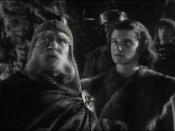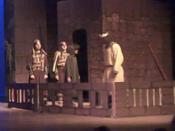A tragic flaw is always involved in the demise of an individual. It is this very flaw which contributes the most to the person's downfall. Similarly, Macbeth's downfall was because of his ambition, and due to him pursuing his goals. The witches awakened Macbeth's ambition and Lady Macbeth's manipulating is one of the primary causes for the development of his ambition. The tragic downfall of Macbeth was not determined by one single cause. It was rather caused by a combination of three dark forces: supernatural, external, and internal. But the element that contributed the most was ambition. At first, Macbeth's ambition prevails as a positive trait. An example of that is when he uses this quality to emerge victorious in the battle waged against the traitors and the Norwegians. It is after the witches prophecies that this trait starts to border over the sinister side, as he now uses his ambition to ascend the throne.
The third phase of this tragic flaw is when the protagonist starts to kill people, performing these crimes in order to protect or preserve his crown.
At first, ambition in Macbeth is present as a quality, a quality due to which Macbeth receives rave references and unbounded respect from others. It is this very trait that helps Macbeth in waging the battle against Macdonwald. The captain, when recounting the events of the fight, says, For brave Macbeth,--well he deserves that name-- Disdaining Fortune, with his brandished steel, Which smoked with bloody execution, Like valor's minion carved out his passage Till he faced the slave; (I,ii,16-20) As a result, even people who weren't present in the clash are commending "Bellona's bridegroom"ÃÂ (I,ii,56). One instance of this is when King Duncan refers to Macbeth as "O valiant cousin! Worthy gentleman!"ÃÂ (I,ii,24) As the play progresses, this very quality swaps positions as now Macbeth is committing crimes, to acquire the throne, crimes which go against the moral laws. He himself ackonowledges, in the following lines, that excess ambition has caused him to start thinking about committing consequential sins.
My thought, whose murder yet is but fantastical, Shakes so my single state of man That function is smothered in surmise, And nothing is but what is not.
(I,iii,140-143) But, one thing that should be kept in mind is that even now, Macbeth is unsure of what he should do. He ends his first soliloquy with the knowlede of the fact that, I have no spur To prick the sides of my intent, but only Vaulting ambition, which o'erleaps itself And falls on the other.
(I,vii,25-28) Nevertheless, Macbeth does go ahead with his evil intentions and kills Duncan.
After Macbeth has attained the throne, he focuses all of his energy towards mantaining his present status and power. In doing so, he becomes extremely proud and insensitive to others' feelings. His ruthlessness is especially obvious when he's told, in the second apparition, that "none of woman born"ÃÂ (IV,i,80) can harm him and he reacts, Then live, Macduff; what need I fear of thee? But yet I'll make assurance double sure, And take a bond of fate. Thou shalt not live; (IV,i,82-84) The excessive ambition for power also takes the form of arrogance. Macbeth becomes so egotistical that he even insults the witches, "How now, you secret, black, and midnight hags!"ÃÂ (IV,i,48), when they are not obeying his commands At first, ambition in Macbeth is presented as a quality. But as the character develops, this "quality"ÃÂ first leads him to murder the king in order to attain the throne and after that forces him to go around killing anyone who may be able to challenge his present power and status. Once referred to as a "valiant cousin"ÃÂ and a "worthy gentleman"ÃÂ, Macbeth, in the end of the play, becomes the "dead butcher"ÃÂ, this transition of titles being a result of allowing himself to get blinded with ambition. This play potrays the complete evolution of Macbeth's character and follows his downfall, which was caused by his choice to pick the path of self-destruction. In the end, Macbeth falls apart and looses everything. Had Macbeth known about this before, he would have rethought his readiness to get so carried away with achieving his aims.





